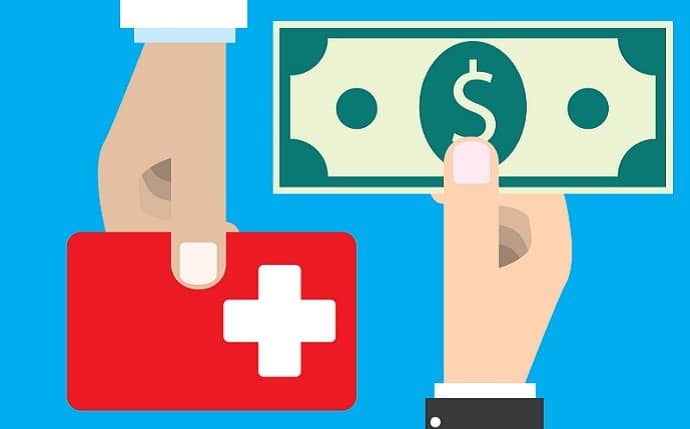What Happens If You Go To A Hospital In The USA Without Health Insurance And Rack Up A High Bill?

The high cost of healthcare in the United States is a significant barrier for many individuals, especially those who do not have health insurance. If you find yourself in a situation where you need medical care but do not have insurance, you may be wondering what will happen if you go to a hospital and end up with a high medical bill.
This can be a daunting and overwhelming prospect, but it is important to understand the potential outcomes and what steps you can take to manage the situation. In this article, we will explore the consequences of seeking medical care without insurance and racking up a high bill, as well as provide guidance on how to navigate this difficult situation.
What Happens If You Go To A Hospital In The USA Without Health Insurance And Rack Up A High Bill?
If you go to a hospital in the USA without health insurance and rack up a high bill, you will be responsible for paying the entire cost of your medical treatment. The cost of healthcare in the United States is notoriously high, and without insurance, you may be facing a bill that is tens or even hundreds of thousands of dollars.
If you cannot afford to pay your medical bills, the hospital may offer you a payment plan or financial assistance program. However, these options may not cover the full cost of your treatment, and you may still be left with a significant amount of debt.
If you do not pay your medical bills, the hospital may turn your debt over to a collection agency, which can negatively impact your credit score and make it difficult to obtain credit in the future. In extreme cases, the hospital may also take legal action to collect the debt.
In the United States, there is no universal healthcare system, and access to affordable healthcare is often tied to having health insurance. It is important to consider the costs and risks associated with not having health insurance and to explore all available options for obtaining coverage.
The Situation Of Seeking Medical Care Without Insurance
Uninsured Individuals Are Responsible For Paying The Full Cost Of Medical Treatment
One of the challenges of being uninsured in the United States is that individuals are responsible for paying the full cost of their medical treatment. Without insurance, there is no negotiated rate for medical services, and individuals must pay the full amount charged by healthcare providers. This can be a significant financial burden, especially for those who require extensive medical care or hospitalization.
In addition, uninsured individuals may not have access to the discounts and financial assistance programs that insurance companies negotiate with healthcare providers. This means that they may be charged more for medical services than an insured individual would be. Even routine medical procedures, such as blood tests or X-rays, can quickly add up to a large bill for uninsured patients.
Overall, the lack of insurance coverage can make accessing medical care and paying for it a significant challenge for many individuals. It is important to be aware of the potential costs and to explore all options for managing medical bills if you find yourself in this situation.
The Potential For A High Bill
Possible Outcomes
Negotiating With The Hospital For A Lower Bill
If you find yourself facing a high medical bill due to seeking medical treatment without insurance coverage in the United States, one potential option for managing the cost is to negotiate with the hospital for a lower bill. While negotiating with healthcare providers may seem daunting, it can be an effective way to reduce your financial burden and make paying your medical bills more manageable.
When negotiating with a hospital for a lower bill, it is important to be prepared and informed. This may involve researching the typical costs of the medical services you received and gathering information about any financial assistance programs or discounts that may be available to uninsured patients. Additionally, it can be helpful to approach the negotiation process with a respectful and collaborative attitude, emphasizing your willingness to work with the hospital to find a solution that works for both parties.
Negotiating with a hospital for a lower bill can take time and effort, but it can be a worthwhile investment in managing your medical costs. It is important to remember that hospitals are often willing to work with patients to find a solution, particularly if it means avoiding unpaid bills or unpaid medical debts. By exploring all options for managing your medical bills, including negotiating with the hospital, you can take control of your financial situation and reduce the stress and burden of a high medical bill.
The Need To Pay Something Upfront To Qualify For Financial Assistance
Many hospitals and healthcare providers in the United States offer financial assistance programs to help uninsured patients manage the cost of their medical treatment. However, it is important to note that in many cases, these programs require patients to pay something upfront in order to qualify for financial assistance.
This upfront payment may take the form of a deposit or a portion of the medical bill, and it is often necessary to demonstrate that the patient is committed to paying for their medical care before financial assistance can be granted. This requirement can be a challenge for many uninsured individuals, who may not have the financial resources to pay upfront for medical treatment.
Despite the challenge of paying something upfront, it is important for uninsured individuals to explore all options for managing their medical bills and accessing financial assistance programs. By working with the hospital or healthcare provider to understand the requirements and options for financial assistance, patients may be able to find a solution that works for their financial situation. This may involve setting up a payment plan or seeking out alternative sources of funding or assistance.
Ultimately, paying something upfront in order to qualify for financial assistance can be a difficult but necessary step in managing the cost of medical treatment without insurance coverage in the United States. It is important to be proactive and informed when seeking medical care, and to explore all options for managing medical bills and accessing financial assistance programs.
The Potential For Negative Effects On Credit Score If Bills Are Not Paid
One potential consequence of seeking medical treatment without insurance coverage in the United States is the negative impact on your credit score if medical bills are not paid. Unpaid medical bills can be reported to credit agencies, which can result in a decrease in your credit score and make it more difficult to obtain credit in the future.
It is important for individuals without insurance coverage to be aware of the potential impact on their credit score and to take steps to manage their medical bills and avoid unpaid debts. This may involve negotiating with healthcare providers for a lower rate, applying for financial assistance programs, or setting up a payment plan to pay off medical debts over time.
By taking proactive steps to manage medical bills, uninsured individuals can avoid the negative impact on their credit score and maintain their financial stability. It is important to be informed and proactive when seeking medical treatment without insurance coverage, and to explore all options for managing medical bills and avoiding unpaid debts
The Possibility Of Legal Action Or Wage Garnishment To Collect Debt
If medical bills are not paid, hospitals and healthcare providers in the United States may take legal action or pursue wage garnishment to collect the debt. This means that they can file a lawsuit against the patient to collect the unpaid balance, which can result in a court order to garnish wages or place a lien on assets.
The possibility of legal action or wage garnishment can be a significant burden for uninsured individuals who are already struggling to manage the cost of medical treatment. It is important for individuals without insurance coverage to be aware of the potential consequences of unpaid medical bills and to take steps to manage their debt.
By exploring all options for managing medical bills, including negotiating with healthcare providers for a lower rate or applying for financial assistance programs, uninsured individuals can avoid the need for legal action or wage garnishment. It is important to be proactive and informed when seeking medical treatment without insurance coverage, and to take steps to manage medical bills and avoid unpaid debts.
In the event that legal action or wage garnishment is pursued, it is important to seek legal advice and explore all options for managing the debt. This may involve negotiating with the healthcare provider or working with a debt management or credit counseling service to develop a repayment plan that works for your financial situation.
What Are Some Common Reasons People In The Usa Go Without Health Insurance?
There are several common reasons why people in the USA go without health insurance, including:
Cost: For many people, the cost of health insurance is simply too high. Even with subsidies or employer-sponsored coverage, the monthly premiums and out-of-pocket costs can be prohibitively expensive.
Unemployment: People who lose their jobs often lose their health insurance along with it. While there are options for continuing coverage through COBRA or marketplace plans, these can also be expensive.
Part-time or self-employment: Many jobs that offer health insurance benefits are full-time positions, leaving part-time or self-employed workers without coverage.
Pre-existing conditions: Before the Affordable Care Act, insurers could deny coverage or charge higher premiums to people with pre-existing conditions. While this is no longer the case, some people may still have difficulty finding affordable coverage if they have a history of serious medical issues.
Immigration status: Undocumented immigrants are not eligible for most forms of public health insurance and may also face barriers to accessing care due to fear of deportation or discrimination.
Belief in good health: Some people choose not to purchase health insurance because they believe they are young, healthy, and unlikely to need medical care. However, unexpected accidents or illnesses can quickly lead to high medical bills and financial hardship.
It is important to note that lack of health insurance can have serious consequences for individuals and families, including delayed or forgone medical care, increased financial strain, and worse health outcomes over time.
How Do Hospitals Determine The Cost Of Medical Treatment?
Hospitals in the USA determine the cost of medical treatment using a variety of factors, including:
Cost of supplies and equipment: Hospitals must purchase supplies and equipment, ranging from bandages and syringes to expensive medical imaging machines. These costs are factored into the overall cost of medical treatment.
Staffing costs: Hospitals employ doctors, nurses, and other medical professionals, whose salaries and benefits are included in the cost of medical treatment. Additionally, hospitals must also pay for administrative staff and support services such as cleaning and food service.
Overhead costs: Hospitals have fixed overhead costs such as building maintenance, utilities, and insurance that are included in the cost of medical treatment.
Location: The cost of medical treatment can vary based on the location of the hospital. Hospitals in urban areas may have higher costs due to higher salaries and rents, while hospitals in rural areas may have lower costs.
Severity of the condition: The cost of medical treatment can vary based on the severity of the condition being treated. More serious or complex conditions may require more specialized equipment, staff, and treatment, resulting in higher costs.
Negotiated rates with insurers: Hospitals negotiate rates with insurance companies and government programs, which can impact the cost of medical treatment for patients with insurance.
It is worth noting that the cost of medical treatment in the USA can be difficult to understand and is often not transparent to patients. Different hospitals may have different pricing structures, and patients may not know the cost of a procedure or service until they receive a bill. Additionally, the cost of medical treatment may be different for uninsured patients who may not have access to negotiated rates or discounts.
Are There Any Government Programs Or Resources Available To Help People Without Health Insurance Pay For Medical Bills?
Yes, there are some government programs and resources available to help people without health insurance pay for medical bills. These include:
Medicaid: Medicaid is a joint federal-state program that provides health coverage to low-income individuals and families. Eligibility for Medicaid varies by state, but generally includes people with low incomes, disabilities, and pregnant women.
Children’s Health Insurance Program (CHIP): CHIP is a federal-state program that provides health coverage to children and teens whose families earn too much to qualify for Medicaid but cannot afford private insurance.
Emergency Medical Treatment and Labor Act (EMTALA): EMTALA requires hospitals that participate in Medicare to provide emergency medical treatment to anyone who needs it, regardless of their ability to pay.
Community health centres: Community health centres are nonprofit, community-based clinics that provide primary and preventive healthcare services to underserved populations. They often offer discounted services or sliding-scale fees based on income.
Medical debt relief programs: There are some nonprofit organizations that offer medical debt relief programs to help people with high medical bills negotiate with hospitals and collection agencies or provide financial assistance to pay off the debt.
It is important to note that while these programs can provide some relief for people without health insurance, they may not cover the full cost of medical treatment, and eligibility requirements can vary. Additionally, some programs may be limited in scope or availability, and accessing them may require navigating a complex system of eligibility rules and application processes.
How Do Medical Bills In The Usa Compare To Other Countries With Universal Healthcare Systems?
Medical bills in the USA are generally much higher than in other countries with universal healthcare systems. The reasons for this are complex, but some factors that contribute to the high cost of medical treatment in the USA include:
High administrative costs: The US healthcare system is notoriously complex, with a fragmented mix of private insurers, government programs, and providers. This complexity leads to higher administrative costs for providers and insurers, which are passed on to patients in the form of higher medical bills.
Higher drug prices: The cost of prescription drugs in the USA is significantly higher than in other countries, in part due to the lack of government price negotiation or regulation.
Higher provider fees: Doctors and hospitals in the USA typically charge higher fees for medical services than in other countries, in part due to the high cost of medical education and malpractice insurance.
Lack of price controls: Unlike many other countries with universal healthcare systems, the USA does not have comprehensive price controls on medical services, leading to higher costs for patients.
In countries with universal healthcare systems, such as Canada, the United Kingdom, and Germany, medical bills are typically lower or even nonexistent for patients. These countries have a variety of approaches to controlling healthcare costs, including government price negotiation, a focus on preventive care, and more efficient administrative systems.
It is worth noting, however, that universal healthcare systems can also have their own challenges, such as longer wait times for non-emergency medical services and limited access to certain specialized treatments.
Can Hospitals Refuse To Treat Patients Without Health Insurance?
In the USA, hospitals that participate in Medicare are required by law to provide emergency medical treatment to anyone who needs it, regardless of their ability to pay. This requirement is outlined in the Emergency Medical Treatment and Labor Act (EMTALA), which was passed in 1986.
Under EMTALA, hospitals that participate in Medicare must provide stabilizing treatment to anyone who comes to the emergency department seeking medical treatment, regardless of their insurance status or ability to pay. This includes patients without health insurance.
However, once a patient has been stabilized and is no longer in an emergency situation, hospitals are not required to continue providing treatment or to admit the patient to the hospital. In some cases, hospitals may transfer patients to other facilities or clinics that are better equipped to provide ongoing care.
It is worth noting that while hospitals are legally required to provide emergency medical treatment, they may still bill patients for the cost of that treatment. This can lead to high medical bills for uninsured patients, which can be difficult to pay without insurance or other financial assistance.
Additionally, some hospitals may have financial assistance programs or sliding scale fees based on income for patients without insurance. Patients should check with the hospital or healthcare provider to see if they offer any such programs or discounts.
What Are Some Tips For Negotiating Medical Bills Or Finding Ways To Reduce The Cost Of Medical Treatment In The USA?
Navigating the complexities of medical bills and insurance can be a daunting task, especially in the USA where healthcare costs are notoriously high. However, there are some tips that can help you negotiate medical bills or find ways to reduce the cost of medical treatment. Here are a few:
Research and compare prices: Before undergoing any medical procedure or treatment, do your research and compare prices. You can use online resources such as Healthcare Bluebook or FAIR Health Consumer to get an idea of what the procedure should cost in your area. This information can be used to negotiate with your healthcare provider or insurance company.
Negotiate with your healthcare provider: Many healthcare providers are willing to negotiate their fees, especially if you are paying out-of-pocket. Don’t be afraid to ask for a discount or payment plan. You can also ask for an itemized bill to make sure you are not being charged for any unnecessary services.
Use in-network providers: If you have insurance, make sure you use in-network providers to avoid out-of-network fees. You can also ask your insurance company to provide you with a list of in-network providers.
Consider medical tourism: If the cost of medical treatment in the USA is too high, you can consider medical tourism. Many countries offer high-quality medical treatment at a fraction of the cost. However, make sure you do your research and choose a reputable provider.
Apply for financial assistance: Many healthcare providers offer financial assistance programs for low-income patients. You can also check with your state or local government to see if you qualify for any healthcare assistance programs.
Consider a healthcare sharing ministry: Healthcare sharing ministries are nonprofit organizations that help members share medical expenses. These organizations can be a good alternative to traditional insurance, especially for those who cannot afford traditional insurance.
How Can People Protect Themselves From High Medical Bills In The Future?
Medical bills can be one of the most significant financial burdens for individuals and families, especially in the USA where healthcare costs are notoriously high. However, there are several ways that people can protect themselves from high medical bills in the future. Here are a few:
Invest in Health Insurance: Health insurance is essential to protect yourself from high medical bills. Health insurance can help you pay for medical expenses, including doctor visits, hospitalizations, prescription drugs, and emergency care. It is important to research and choose a plan that best fits your healthcare needs and budget.
Save for Medical Expenses: It is essential to start saving for medical expenses before you need medical treatment. This can help you pay for any out-of-pocket expenses and reduce the burden of high medical bills. Consider setting up a health savings account (HSA) or a flexible spending account (FSA) to save pre-tax dollars for medical expenses.
Read Your Medical Bills Carefully: It is important to read your medical bills carefully to ensure that you are not being charged for any unnecessary services or procedures. If you have any questions about your bill, don’t hesitate to ask your healthcare provider or insurance company for clarification.
Practice Preventive Care: Investing in preventive care, such as regular check-ups, vaccinations, and a healthy lifestyle, can help you avoid costly medical treatments in the future. Preventive care can help detect health issues early on, making treatment more effective and less expensive.
Understand Your Healthcare Plan: It is essential to understand your healthcare plan and the benefits it offers. This includes knowing what services are covered, what your out-of-pocket expenses are, and what your deductible is. Understanding your plan can help you make informed decisions about your healthcare and avoid unexpected medical bills.
Conclusion
In conclusion, seeking medical treatment without insurance coverage in the United States can be a challenging and potentially costly experience. Without the protection of health insurance, uninsured individuals may be responsible for paying the full cost of medical treatment, which can result in high bills and significant financial burdens.
While there are options available for managing medical bills and accessing financial assistance programs, uninsured individuals may need to navigate complex processes and requirements in order to access these resources. This can include negotiating with healthcare providers for a lower rate, applying for financial assistance programs, or setting up a payment plan to pay off medical debts over time.
It is important for uninsured individuals to be proactive and informed when seeking medical treatment without insurance coverage, and to explore all options for managing medical bills and avoiding unpaid debts. By taking steps to manage medical bills, uninsured individuals can avoid the negative impact on their credit score and potential legal action or wage garnishment to collect unpaid debts.
Ultimately, seeking medical treatment without insurance coverage can be a difficult and costly experience, but with the right information and resources, uninsured individuals can manage their medical bills and access the care they need.



